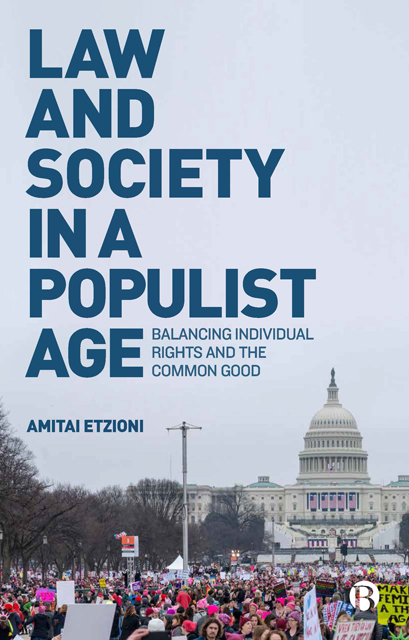one - A response to populismv
Published online by Cambridge University Press: 21 April 2023
Summary
Liberalism provides an incomplete moral language to address the populism that is rising in many democratic polities. Communitarian conceptions must be included in order to provide a more comprehensive moral language. This addition, however, raises issues because liberal and communitarian conceptions are in conflict with one another to some extent. In the following discussion I suggest ways that this conflict can be limited, and I outline a liberal communitarian approach as an effective response to populism.
One should note from the outset that this approach holds that societies cannot be designed to follow one overarching principle, because of differences in the needs, interests, and values of their various members. That is, no value can be maximized.
The discussion is centered on two recent variants of philosophical positions that have a long and rich history: globalism, a subcategory of contemporary classical liberalism—and nationalism, a particular form of communitarianism. Thus, globalism draws on liberal elements, but other forms of liberalism do not necessarily share the globalists’ positions, as is true for contemporary classical liberalism and so-called welfare liberalism. Nationalism is a form of communitarianism because it views the nation as the major community (whether real or imagined). Other communitarians do not necessarily share this view—for instance, those who see their main community as their confessional or ethnic one.
Populism: definition and causes
The hallmarks of populism include a demagogue who appeals to the masses in highly emotive terms, attacking the institutions of civil society, offering ready-made solutions for society’s complex challenges, and promising to deliver those solutions. Cas Mudde characterizes populism as a “thin ideology,” one that provides an ideological framework, according to which good people are being abused by a corrupt elite.(He contrasts it with pluralism, which accepts the legitimacy of many different groups and sets of values.) Similarly, Jan-Werner Müller argues that populists are antipluralist, that populism is a form of identity politics, and is always critical of elites.The rise of populism in many democratic polities in the 2010s is often attributed to a nationalistic reaction to the ascent of globalization, whose champions hold many of the same positions as contemporary liberals. They favor open societies—open to the flow of goods, people, and ideas.
- Type
- Chapter
- Information
- Law and Society in a Populist AgeBalancing Individual Rights and the Common Good, pp. 3 - 26Publisher: Bristol University PressPrint publication year: 2018

